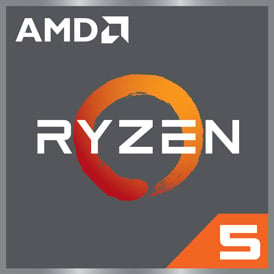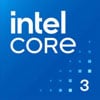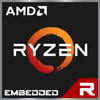
AMD Ryzen 5 3500C Benchmark, Test and specs
Last updated:
The AMD Ryzen 5 3500C has 4 cores with 8 threads and is based on the 3. gen of the AMD Ryzen 5 series. The processor uses a mainboard with the FP5 socket and was released in Q3/2020. The AMD Ryzen 5 3500C scores 719 points in the Geekbench 5 single-core benchmark. In the Geekbench 5 multi-core benchmark, the result is 3,080 points.

| Name: | AMD Ryzen 5 3500C |
|---|---|
| Family: | AMD Ryzen 5 (84) |
| CPU group: | AMD Ryzen 3000C (3) |
| Architecture: | Picasso (Zen+) |
| Segment: | Mobile |
| Generation: | 3 |
| Predecessor: | -- |
| Successor: | AMD Ryzen 5 5625C |
CPU Cores and Base Frequency
The AMD Ryzen 5 3500C has 4 CPU cores and can calculate 8 threads in parallel. The clock frequency of the AMD Ryzen 5 3500C is 2.10 GHz (3.70 GHz). The number of CPU cores greatly affects the speed of the processor and is an important performance indicator.
| CPU Cores / Threads: | 4 / 8 |
|---|---|
| Core architecture: | normal |
| Cores: | 4x |
| Hyperthreading / SMT: | Yes |
|---|---|
| Overclocking: | No |
| Frequency: | 2.10 GHz |
| Turbo Frequency (1 Core): | 3.70 GHz |
| Turbo Frequency (4 Cores): | 2.50 GHz |
Internal Graphics
The AMD Ryzen 5 3500C has integrated graphics, called iGPU for short. Specifically, the AMD Ryzen 5 3500C uses the AMD Radeon RX Vega 8 (Raven Ridge), which has 512 texture shaders and 8 execution units. The iGPU uses the system's main memory as graphics memory and sits on the processor's die.
| GPU name: | AMD Radeon RX Vega 8 (Raven Ridge) |
|---|---|
| GPU frequency: | 1.20 GHz |
| GPU (Turbo): | No turbo |
| Compute units: | 8 |
| Shader: | 512 |
| Hardware Raytracing: | No |
| Release date: | Q1/2018 |
| Max. displays: | 3 |
|---|---|
| Generation: | 8 |
| Direct X: | 12 |
| Technology: | 14 nm |
| Max. GPU Memory: | 2 GB |
| Frame Generation: | No |
Hardware codec support
A photo or video codec that is accelerated in hardware can greatly accelerate the working speed of a processor and extend the battery life of notebooks or smartphones when playing videos.
| h265 / HEVC (8 bit): | Decode / Encode |
|---|---|
| h265 / HEVC (10 bit): | Decode / Encode |
| h264: | Decode / Encode |
| VP8: | Decode / Encode |
| VP9: | Decode / Encode |
| AV1: | No |
|---|---|
| AVC: | Decode / Encode |
| VC-1: | Decode |
| JPEG: | Decode / Encode |
Memory & PCIeThe processor can use up to 64 GB memory in 2 (Dual Channel) memory channels. The maximum memory bandwidth is 42.7 GB/s. The memory type as well as the amount of memory can greatly affect the speed of the system. |
|
| Memory type: | Memory bandwidth: |
|---|---|
| DDR4-2666 | 42.7 GB/s |
| Max. Memory: | 64 GB |
| Memory channels: | 2 (Dual Channel) |
| ECC: | Yes |
| PCIe: | 3.0 x 20 |
| PCIe Bandwidth: | 19.7 GB/s |
Thermal ManagementThe thermal design power (TDP for short) of the processor is 15 W. The TDP specifies the necessary cooling solution that is required to cool the processor sufficiently. The TDP usually gives a rough idea of the actual power consumption of the CPU. |
|
|---|---|
| TDP (PL1 / PBP): | 15 W |
| TDP (PL2): | -- |
| TDP up: | 25 W |
| TDP down: | 12 W |
| Tjunction max.: | 105 °C |
Technical details
The AMD Ryzen 5 3500C is made in 12 nm. The smaller the manufacturing process of a CPU, the more modern and energy-efficient it is. Overall, the processor has 6.00 MB cache. A large cache can greatly speed up the processor's speed in some cases such as games.
| Technology: | 12 nm |
|---|---|
| Chip design: | Chiplet |
| Socket: | FP5 |
| L2-Cache: | 2.00 MB |
| L3-Cache: | 4.00 MB |
| AES-NI: | Yes |
| Operating systems: | Windows 10, Windows 11, Linux |
| Virtualization: | AMD-V, SVM |
|---|---|
| Instruction set (ISA): | x86-64 (64 bit) |
| ISA extensions: | SSE4a, SSE4.1, SSE4.2, AVX2, FMA3 |
| Release date: | Q3/2020 |
| Release price: | -- |
| Part Number: | -- |
| Documents: | Technical data sheet |
Rate this processor
Benchmark results

The benchmark results for the AMD Ryzen 5 3500C have been carefully checked by us. We only publish benchmark results that have been created by us or that have been submitted by a visitor and then checked by a team member. All results are based on and fullfill our benchmark guidelines.
Geekbench 5, 64bit (Single-Core)
Geekbench 5 is a cross plattform benchmark that heavily uses the systems memory. A fast memory will push the result a lot. The single-core test only uses one CPU core, the amount of cores or hyperthreading ability doesn't count.

|
Intel Pentium G3258
2C 2T @ 3.20 GHz |
||

|
Intel Pentium G3420
2C 2T @ 3.20 GHz |
||

|
Intel Core i3-6100TE
2C 4T @ 2.70 GHz |
||
|
|
AMD Ryzen 5 3500C
4C 8T @ 3.70 GHz |
||

|
Intel Core i5-2380P
4C 4T @ 3.40 GHz |
||

|
Intel Core i7-4712HQ
4C 8T @ 3.30 GHz |
||

|
Intel Core i7-3610QE
4C 8T @ 3.30 GHz |
||
Geekbench 5, 64bit (Multi-Core)
Geekbench 5 is a cross plattform benchmark that heavily uses the systems memory. A fast memory will push the result a lot. The multi-core test involves all CPU cores and taks a big advantage of hyperthreading.

|
AMD Ryzen 7 2800H
4C 8T @ 3.30 GHz |
||

|
MediaTek Kompanio 1300T
8C 8T @ 2.60 GHz |
||

|
Intel Core i5-7600T
4C 4T @ 3.50 GHz |
||
|
|
AMD Ryzen 5 3500C
4C 8T @ 2.50 GHz |
||

|
Intel Core i7-3740QM
4C 8T @ 2.70 GHz |
||

|
Intel Core i7-8650U
4C 8T @ 2.60 GHz |
||

|
Intel Core i7-6700HQ
4C 8T @ 3.20 GHz |
||
Geekbench 6 (Single-Core)
Geekbench 6 is a benchmark for modern computers, notebooks and smartphones. What is new is an optimized utilization of newer CPU architectures, e.g. based on the big.LITTLE concept and combining CPU cores of different sizes. The single-core benchmark only evaluates the performance of the fastest CPU core, the number of CPU cores in a processor is irrelevant here.

|
AMD Ryzen 3 3200U
2C 4T @ 3.50 GHz |
||

|
AMD Ryzen 3 3250U
2C 4T @ 3.50 GHz |
||

|
Intel Core i7-4510U
2C 4T @ 3.10 GHz |
||
|
|
AMD Ryzen 5 3500C
4C 8T @ 3.70 GHz |
||

|
AMD EPYC 7401P
24C 48T @ 3.00 GHz |
||

|
AMD EPYC 7351P
16C 32T @ 2.90 GHz |
||

|
Intel Core i3-7130U
2C 4T @ 2.70 GHz |
||
Geekbench 6 (Multi-Core)
Geekbench 6 is a benchmark for modern computers, notebooks and smartphones. What is new is an optimized utilization of newer CPU architectures, e.g. based on the big.LITTLE concept and combining CPU cores of different sizes. The multi-core benchmark evaluates the performance of all of the processor's CPU cores. Virtual thread improvements such as AMD SMT or Intel's Hyper-Threading have a positive impact on the benchmark result.

|
Intel Core i7-3632QM
4C 8T @ 2.20 GHz |
||

|
Intel Core i5-3550S
4C 4T @ 3.00 GHz |
||

|
Samsung Exynos 9820
8C 8T @ 2.70 GHz |
||
|
|
AMD Ryzen 5 3500C
4C 8T @ 2.50 GHz |
||

|
Samsung Exynos 9825
8C 8T @ 2.73 GHz |
||

|
Intel Core i5-6360U
2C 4T @ 3.00 GHz |
||

|
AMD Ryzen 3 5125C
2C 4T @ 3.00 GHz |
||
iGPU - FP32 Performance (Single-precision GFLOPS)
The theoretical computing performance of the internal graphics unit of the processor with simple accuracy (32 bit) in GFLOPS. GFLOPS indicates how many billion floating point operations the iGPU can perform per second.

|
Intel Core 3 processor 100U
Intel Iris Xe Graphics 64 (Alder Lake) @ 1.25 GHz |
||

|
Intel Core i3-1305U
Intel Iris Xe Graphics 64 (Alder Lake) @ 1.25 GHz |
||

|
Intel Core i3-1315U
Intel Iris Xe Graphics 64 (Alder Lake) @ 1.25 GHz |
||
|
|
AMD Ryzen 5 3500C
AMD Radeon RX Vega 8 (Raven Ridge) @ 1.20 GHz |
||

|
AMD Ryzen 5 5560U
AMD Radeon RX Vega 6 (Renoir) @ 1.60 GHz |
||

|
AMD Ryzen Embedded R2514
AMD Radeon RX Vega 8 (Raven Ridge) @ 1.20 GHz |
||

|
AMD Ryzen 3 PRO 5475U
AMD Radeon RX Vega 6 (Renoir) @ 1.60 GHz |
||
Estimated results for PassMark CPU Mark
Some of the CPUs listed below have been benchmarked by CPU-monkey. However the majority of CPUs have not been tested and the results have been estimated by a CPU-monkey’s secret proprietary formula. As such they do not accurately reflect the actual Passmark CPU mark values and are not endorsed by PassMark Software Pty Ltd.

|
Intel Processor N100
4C 4T @ 3.00 GHz |
||

|
AMD Phenom II X6 1065T
6C 6T @ 3.40 GHz |
||

|
Intel Xeon E3-1270
4C 8T @ 3.60 GHz |
||
|
|
AMD Ryzen 5 3500C
4C 8T @ 2.50 GHz |
||

|
Apple A13 Bionic
6C 6T @ 2.65 GHz |
||

|
Intel Core i5-4590
4C 4T @ 3.50 GHz |
||

|
Intel Core i7-4701EQ
4C 8T @ 3.00 GHz |
||
Benchmarks

Geekbench 5 (SC)
2,488 entries
2,488 entries

Geekbench 5 (MC)
2,461 entries
2,461 entries

Geekbench 6 (SC)
1,755 entries
1,755 entries

Geekbench 6 (MC)
1,703 entries
1,703 entries

FP32 SP (iGPU)
2,026 entries
2,026 entries

PassMark CPU-Mark
2,392 entries
2,392 entries
Popular comparisons
back to index






